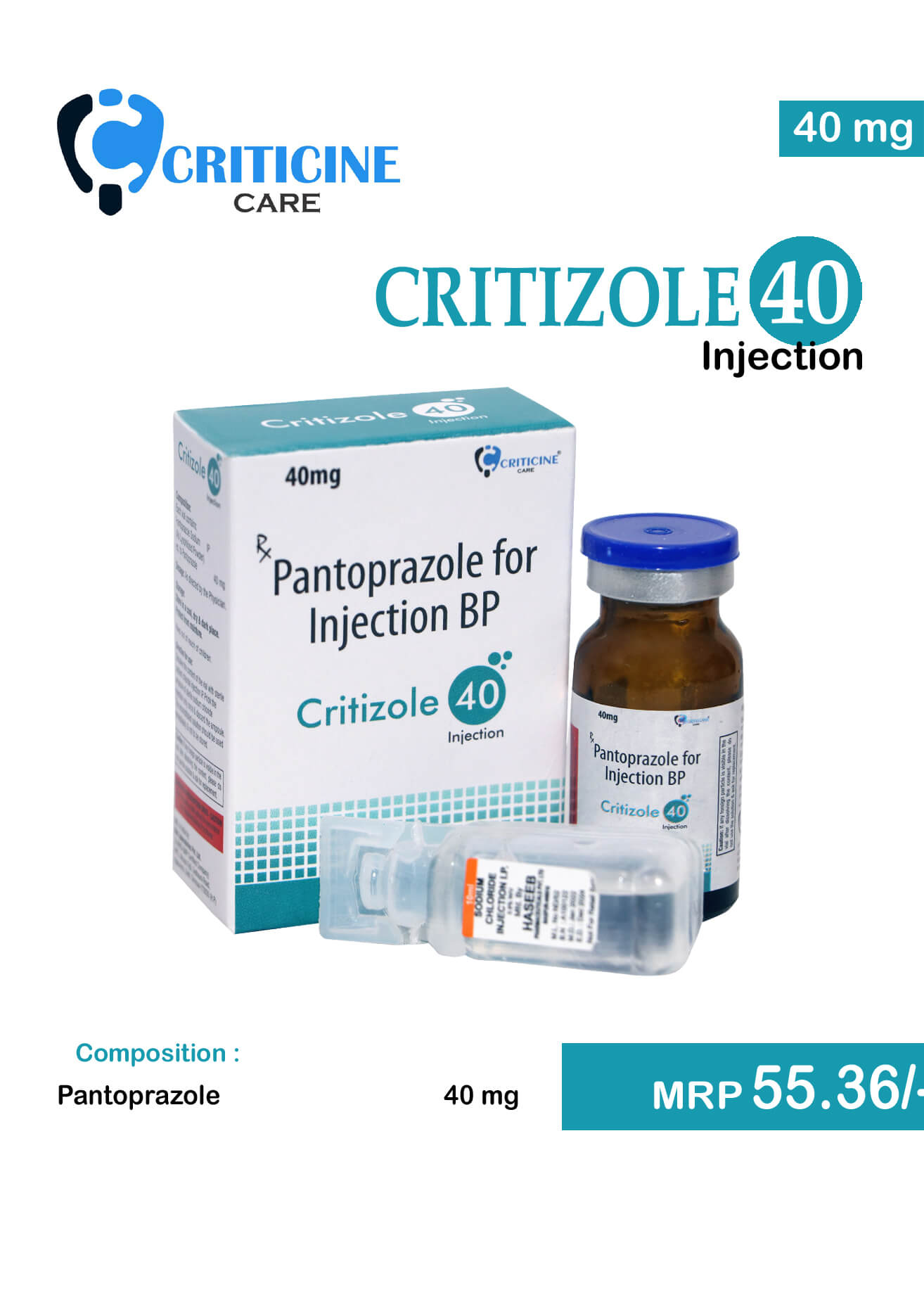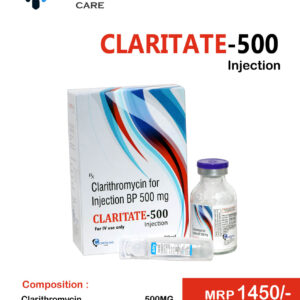- Plot No 351, Industrial Area Phase 2, Panchkula, Haryana
- Mail us - contact@criticinecare.com
- Call us at - 8264040991
- Home
- Critical Care Products | Injection | Range
- Pantoprazole Injection
Pantoprazole Injection
PANCRIT 40
Pancrit-40 is the composition of Pantoprazole Injection is a medication used to treat conditions that involve excessive acid production in the stomach, such as gastroesophageal reflux disease (GERD), ulcers, and Zollinger-Ellison syndrome. It belongs to a class of drugs known as proton pump inhibitors (PPIs), which work by reducing the amount of acid produced in the stomach. Pantoprazole Injection can also help to alleviate symptoms such as heartburn, difficulty swallowing, and persistent cough.
Pantoprazole Injection is generally administered by a healthcare professional and is available in several strengths. It works by blocking the action of the proton pump, a protein in the stomach lining that produces acid. By inhibiting the proton pump, Pantoprazole Injection reduces the amount of acid produced in the stomach, which can help to alleviate symptoms and heal damaged tissue in the esophagus or stomach. Pantoprazole Injection is a fast-acting medication that provides relief within hours of administration.
Uses of Pantoprazole Injection
The way pantoprazole Injection works is basically it blocks the action of the proton pump, a protein in the stomach lining that produces acid. By inhibiting the proton pump, Pantoprazole Injection reduces the amount of acid produced in the stomach, which can help to alleviate symptoms and heal damaged tissue in the esophagus or stomach. This Injection is a fast-acting medication that provides relief within hours of administration.
- It is also used to treat conditions caused by excessive acid secretion in the stomach, such as Zollinger-Ellison syndrome and other hypersecretory conditions.
- Pantoprazole Injection is used to prevent and treat stomach and intestinal ulcers, including those caused by nonsteroidal anti-inflammatory drugs (NSAIDs) like aspirin and ibuprofen.
- It may be used as part of combination therapy for the eradication of Helicobacter pylori, a bacterium that can cause stomach ulcers and other digestive problems.
- This Injection is also used to reduce the risk of upper gastrointestinal bleeding in critically ill patients who require mechanical ventilation in the intensive care unit (ICU).
- The injection may be given to patients who are unable to take oral medications, such as those who are unconscious or have difficulty swallowing.
Possible Side Effects
Pantoprazole Injection may cause some basic side effects in some individuals that might take some time to go away. Have a look at them:
- Diarrhea
- Flatulence
- Headache
- Joint pain
- Nausea
Directions For Use
- It is usually given by a healthcare professional in a hospital or clinic setting. Follow all instructions provided by your healthcare provider.
- The dosage and duration of treatment will depend on the specific condition being treated, the patient’s age and weight, and other factors. Do not change your dose or stop using this Injection without consulting your doctor.
- The injection should be given slowly over 2-15 minutes, depending on the dose and the patient’s condition. Do not inject the medication too quickly.
- The injection may be given intravenously (into a vein) or intramuscularly (into a muscle). The route of administration will depend on the patient’s condition and the specific instructions of the healthcare provider.
- If you miss a dose of pantoprazole, contact your healthcare provider to determine when the next dose should be given.
- If you experience any side effects or have any concerns about using Pantoprazole Injection, talk to your doctor or pharmacist.
Safety Precautions
- The continued usage of this medicine can increase the risk of fractures of the hip, spine, and wrist thus one needs to tell thier doctor if they have any issues such as osteoporosis and bone-related problems.
- Inform your healthcare provider if you have any medical conditions or allergies before taking Pantoprazole Injection.
- Follow the dosage and administration instructions provided by your healthcare provider. Do not use more or less than recommended.
- Inform your healthcare provider of any other medications you are taking, including over-the-counter medications, herbal remedies, and dietary supplements.
- Store Pantoprazole Injection as directed, and keep it out of the reach of children and pets.
Frequently Asked Questions (FAQ)
1 What Are The Long-Term Effects Of Using Pantoprazole Injection?
The continuous usage of this medicine may lead to atrophic gastritis, Vitamin B12 deficiency, weakening of bones or osteoporosis, and much more.
2 Does Pantoprazole Interfere with Or Affect Any Kind Of Laboratory Test Reports?
Yes, the usage of Pantoprazole may alter certain medical tests like urine screening tests and neuroendocrine tumors.
3 How Can I Manage My Long-Term Side Effects?
The long-term usage of these meidcines may weaken your bone and lower hemoglobin
4 Can Pantoprazole Injection Treat Gastric Bleeding?
No, it has been seen that pantoprazole just solves the issue of excess production of stomach acid causing acid reflux and heartburn. In case you face the issue of gastric bleeding, then contact a doctor immediately.
| Brand Name | PANCRIT 40 |
|---|---|
| Composition | Pantoprazole 40 MG |
| MRP | ₹56.5 |
| Packing | 10ML Vial+WFI |






